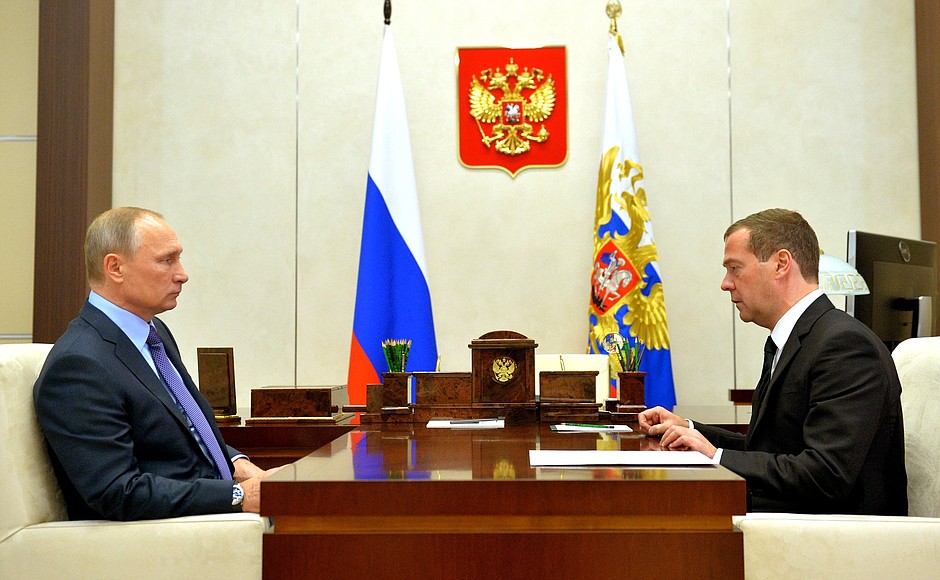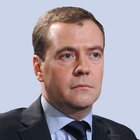
President of Russia Vladimir Putin: Mr Medvedev, the Government has put a lot of effort into drafting the budget. I believe that even those who know little about the budget process can see how challenging this was in the current situation. But work on the budget is nearing completion. What parameters have you coordinated?
Prime Minister Dmitry Medvedev: Mr President, I can tell you that the Government has finished working on the budget and will submit it to the State Duma this week. As the Government reported to you, the draft is based on conservative estimates, which appears to be a wise decision in the current socioeconomic situation.
This means, first, that the budget is based on oil prices of $40 per barrel, even though they are higher now, but we have opted for a lower price to be able to honour our social obligations.
Second, the budget envisages financing for all social projects of a normative nature. Not a single social obligation has been cancelled or reduced. On the contrary, we have indexed some of them both for 2017 and for the planning period of 2018–2019.
We plan revenues at 13.5 trillion rubles and expenditures at 16 trillion. It is a deficit budget.
Vladimir Putin: It is not a big deficit.
Dmitry Medvedev: Yes, we plan the deficit at some 3 percent [of GDP]. Therefore, the parameters we have discussed with you will not be affected.
In addition to the draft budget, we are submitting the main points of the customs, tax and fiscal policies and – as agreed – our projections for the social and economic development for 2017, 2018 and 2019.
Vladimir Putin: We know that those projections have caused debates between the Finance Ministry and the Economic Development Ministry. It is also important to take into account the Central Bank’s position. As I understand, the colleagues have finally reached an agreement.
Dmitry Medvedev: Yes, indeed, there were debates, but ultimately they did agree on a common position on the key macroeconomic parameters, including the inflation forecast. As you know, inflation has slowed down significantly in recent years, and is even lower than expected this year.
Next year, we assume (a common, consolidated projection of the Finance and Economic Development ministries, and the Central Bank) a 4 percent price rise, or inflation. We will continue working to keep inflation down to this rate, and to further decrease the budget deficit by an average one percentage point per year.
Vladimir Putin: As we agreed, the 2017 spending will include funds for a one-time indexing – well, not indexing, exactly, but a payment of 5,000 rubles for pensioners in all categories – and resources for indexation to compensate for this year’s real inflation.
Dmitry Medvedev: Exactly. We have allocated over 220 billion rubles for a one-time payment to all pensioners, both employed and non-employed, as well as funds for the indexation based on the 2016 results, which will be done at the beginning of 2017. So we are back to the indexation level we originally planned, which is at the rate of inflation.
Vladimir Putin: What about other social expenses? Were they included as planned, as requested by ministries and agencies?
Dmitry Medvedev: Yes. All the social expenses, all the expenses related to payments, compensations, pensions – all the social expenditure in its entirety has been planned to the extent required. They will not be reduced and will remain at the target level. All our social obligations under the law will be funded in full through 2019.
It was not an easy task. Thank you for your high assessment of our hard work. We have managed to get back to more stable figures, which is very important for the state’s commitments.
Vladimir Putin: Now we are entering another stage, which is just as difficult. This stage involves discussing the budget with the State Duma. These discussions always reveal new ideas and requirements.
You will have to work carefully with the parliament members in order to preserve the balance of the macroeconomic indicators. And, of course, you will need to listen to the suggestions and recommendations of the parliament.
Dmitry Medvedev: The Government will, by all means, have an open discussion with all the parliamentary parties in the State Duma. We are ready to review the budgetary framework based on the assumptions that you have just mentioned to maintain the balance of the main budget indicators.
At the same time, in all likelihood, during the first and second readings, the budget will be subject to some adjustments, as it always happens.
After the review, the budget will be presented to the President for signing.
Vladimir Putin: Good.
<…>
